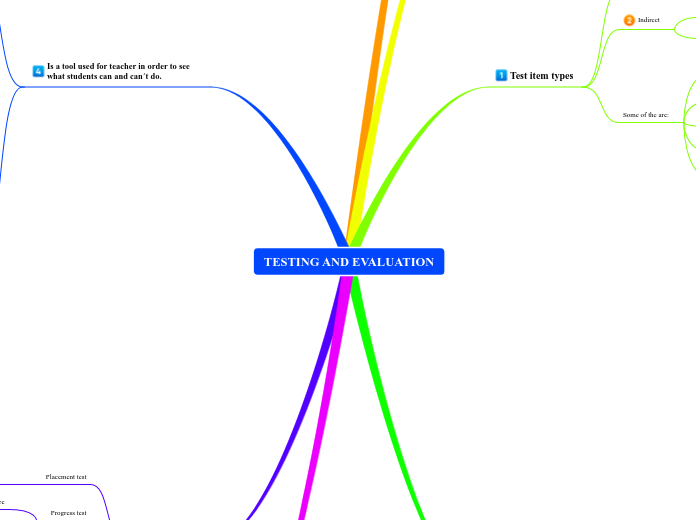TESTING AND EVALUATION
Summative assessment
Use to measures the product of a student´s learning
Taking into account how much a candidate knows
Formative assessment
Measures the student´s abilities as part as process
Teachers and students are involeved
Focus on how the students learn
Helps to the students progress to the next level
Student´s motivation
It has an emotional impact
Recognise the full range of achievement of all learners
Analyse the results and help to the students to do better
Test item types
Direct
Language tasks
Indirect
Grammar
Vocabulary
Some of the are:
Multiple choice
They are very common, used to measure vocabulary and grammar
Gap fill
Complete word or phrases
Transformation
Rewrite sentences
Reordering
Put the words in the right order
Summarising
Put what the students undertand in words
Skill focus test
Are based on the assesment of the language skills
Reading
Some of the are:
Multiple choice test
Writing descriptions
Paragraphs summary
Speaking
Some of the are:
Repeating
Interviews
Contrast and compare
Role play
Description
Reading aloud
Listening
Some of the are:
Filling the missing word
Following directions
Identify emotions
Identify who says what
Identify objects
Completing charts with listening activities
Writing
Some of the are:
Letters and e-mails
Compositions
Newspapers
Reviews
The young learners test item types
Some of the are:
Pictures
Are images related with concepts
Ticks
Put crosses against pictures
Dragging
Click in apropiate pictures-select
Is a tool used for teacher in order to see what students can and can´t do.
Through
Feedback
Feedback hellps students to improve in the process
Teachers desing
Tests and take into account
Objectives
Be clear with the strengths and waeknesses that studensts need to develop
Student´s Context
Take into account the time and the studens conditions
Future Action
Be clear about what is the next step after the test
Other factors
Test content
Balance
Scoring
Trialling test
Marking tests characteristics
They are administered and graded digitally
Strategies to evaluate
Training
More than one scorer
Analytic profiles
Scoring and interacting
Qualities of a good test
Transparency
Anyone concerned with the test should have acces to clear steatements
Validity
A test is valid if it tests what it is supposes to test
Contruct
Approach
is valid only if the test offers as accurate as possible a picture of the skill or ability it is supposed to measure
Content
Reliability
Refers to the consistency of the test results
Clear instructions
Washback
The tests have a really powerful effect on wha happens in classrooms
Good test have a very positive washback effect
Types of test
Placement test
Measures the leavel of proficiency in a new language
Progress test
Are used to measure the needs to be done in the future
Have a formative purpose
Proficiency test
Gives a snapshot picture of the knowledge and ability of thr student
Portafolio assessments
Students are evaluated based on some of the best pieces of work they produced in a period of time
Teaching for tests
Preparing students for a particular test format
Train for test types
Give to the studdents training to help them approach test items more effectively
Train for test rubrics
Remind to the students about the importance of reading the rubrics carefully and give chances to practise this
Discuss general exam skills
The students need to be able to organise their work so that they can revise effectively
Do practice test
Diffuse the tension; Making students feel more relaxed about the experience, it means, give to them opportunities to practise taking the test or exam.
Have fun
The students need to practise certain test types in different ways of having fun with tests and exams.
